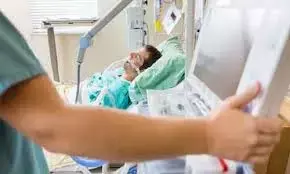- Home
- Medical news & Guidelines
- Anesthesiology
- Cardiology and CTVS
- Critical Care
- Dentistry
- Dermatology
- Diabetes and Endocrinology
- ENT
- Gastroenterology
- Medicine
- Nephrology
- Neurology
- Obstretics-Gynaecology
- Oncology
- Ophthalmology
- Orthopaedics
- Pediatrics-Neonatology
- Psychiatry
- Pulmonology
- Radiology
- Surgery
- Urology
- Laboratory Medicine
- Diet
- Nursing
- Paramedical
- Physiotherapy
- Health news
- Fact Check
- Bone Health Fact Check
- Brain Health Fact Check
- Cancer Related Fact Check
- Child Care Fact Check
- Dental and oral health fact check
- Diabetes and metabolic health fact check
- Diet and Nutrition Fact Check
- Eye and ENT Care Fact Check
- Fitness fact check
- Gut health fact check
- Heart health fact check
- Kidney health fact check
- Medical education fact check
- Men's health fact check
- Respiratory fact check
- Skin and hair care fact check
- Vaccine and Immunization fact check
- Women's health fact check
- AYUSH
- State News
- Andaman and Nicobar Islands
- Andhra Pradesh
- Arunachal Pradesh
- Assam
- Bihar
- Chandigarh
- Chattisgarh
- Dadra and Nagar Haveli
- Daman and Diu
- Delhi
- Goa
- Gujarat
- Haryana
- Himachal Pradesh
- Jammu & Kashmir
- Jharkhand
- Karnataka
- Kerala
- Ladakh
- Lakshadweep
- Madhya Pradesh
- Maharashtra
- Manipur
- Meghalaya
- Mizoram
- Nagaland
- Odisha
- Puducherry
- Punjab
- Rajasthan
- Sikkim
- Tamil Nadu
- Telangana
- Tripura
- Uttar Pradesh
- Uttrakhand
- West Bengal
- Medical Education
- Industry
CPAP may do away with need for ventilation in COVID-19 patients: BMJ

UK: The administration of continuous positive airway pressure (CPAP) may help in avoiding mechanical ventilation in COVID-19 patients, a recent study has found. Results of the study are significant as CPAP is less invasive and less costly than invasive ventilation.
According to the study, published in the journal BMJ Open Respiratory Research, CPAP administration outside ICU or high dependency unit environment helped in avoiding mechanical ventilation in 58% of the patients. Further, 79% (19 out of 24) patients survived and were discharged.
The COVID-19 pandemic has affected over 10 million people worldwide. 5% of the patients become seriously unwell and of this 20-30 % require critical care support. CPAP is a potential supportive treatment for patients in type 1 respiratory failure. But there are some concerns about its use in COVID-19 including the risk of lung barotrauma and increased SARS-CoV-2 aerosolization. However, with early anecdotal experience, the newer guidelines are suggesting CPAP as an option for care sans any evidence for its efficacy. To address this knowledge gap, Rebecca Nightingale, Department of Clinical Sciences, Liverpool School of Tropical Medicine, Liverpool, UK, and colleagues presented a case series to describe and evaluate their experience of CPAP for the treatment of type 1 respiratory failure in COVID-19 patients.
The study included 24 COVID-19 patients with type 1 respiratory failure. They were given CPAP in a repurposed unit of negative pressure rooms. Initially, they were given 1 hour of CPAP with a starting level of 5 cm H2O and increasing to 10 cm H2O, as needed. Oxygen flow was gradually increased to maintain oxygen saturation >94%.
Key findings of the study include:
- More than half of patients (14/24, or 58%) avoided invasive ventilation and were successfully weaned off CPAP and discharged.
- Only 1 patient died on CPAP.
- 9 of 24 patients or 38% required intubation.
- 4 of 9 or 44% died after invasive mechanical ventilation.
- Overall, 79% of the patients (19/24) survived.
"Overall, our results were positive; we were able to safely administer CPAP outside the walls of a critical care or high dependency unit environment and over half of patients (58%) avoided mechanical ventilation and a total of 19 out of 24 (79%) have survived and been discharged from our care," concluded the authors.
The study, "Is continuous positive airway pressure (CPAP) a new standard of care for type 1 respiratory failure in COVID-19 patients? A retrospective observational study of a dedicated COVID-19 CPAP service," is published in the journal BMJ Open Respiratory Research.
Dr Kamal Kant Kohli-MBBS, DTCD- a chest specialist with more than 30 years of practice and a flair for writing clinical articles, Dr Kamal Kant Kohli joined Medical Dialogues as a Chief Editor of Medical News. Besides writing articles, as an editor, he proofreads and verifies all the medical content published on Medical Dialogues including those coming from journals, studies,medical conferences,guidelines etc. Email: drkohli@medicaldialogues.in. Contact no. 011-43720751


